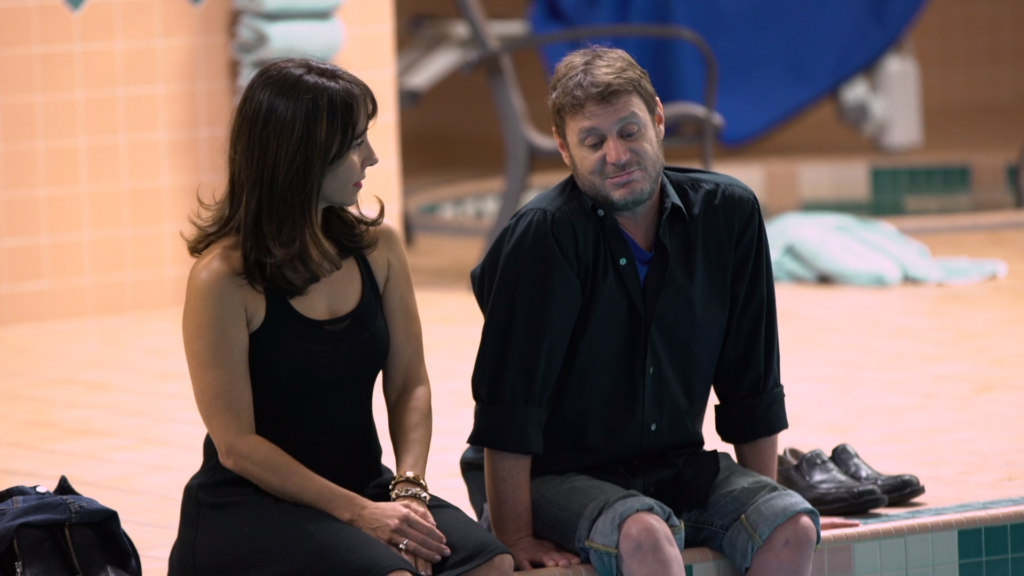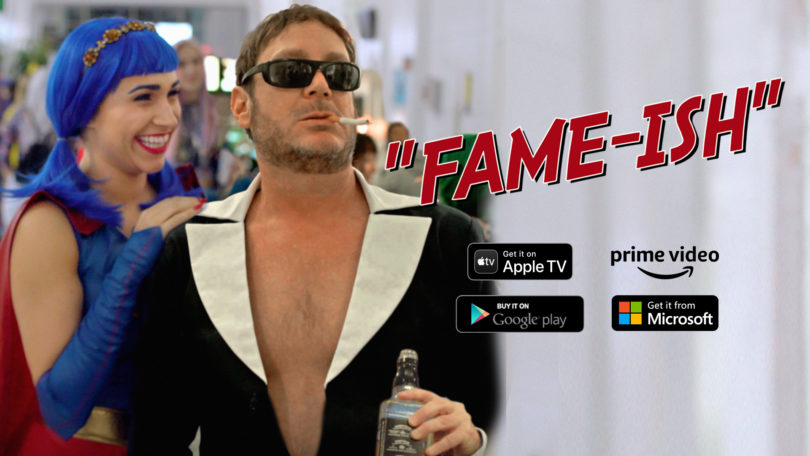Note: This review contains minor spoilers, so you might want to watch the film first by visiting the links below! Fame-ish contains suggestive dialogue, coarse language, and adult situations, so viewer discretion is advised.
At last, director Jeff Nimoy’s anticipated Fame-ish (2020) has been released on DVD and digital download by Random Media! The first of its kind comic-con rom-com takes place during an actual anime convention in Madison, Wisconsin to tell a fictional story about caricaturized versions of several notable names in the anime world—including Lex Lang, Brian Donovan, and of course, Jeff Nimoy.

A washed-up director living in Los Angeles desperate for work catches a lucky break when he is invited to be the guest of honor at an anime convention. Fistfuls of badly needed dollars are his for only a weekend of his time signing autographs and hosting a few panels for attendees. There’s a catch, though, for this germophobe: he’ll have to shake hands with and possibly even hug his fans! This ends up being the least of his concerns, though, as he stumbles through his alcohol-fueled miasma of an ego trip that forces him to define his relationships with fans, fellow professionals, and, most challenging of all, himself.
His foray into the business behind the anime business is a cringeworthy excursion meant to provoke laughter while also wading into some of the deeper waters surrounding the subcultures of fandom—namely the rock-star mentality that personalities (in this case, particularly men) often succumb to after experiencing only the smallest whiff of fame. Fame-ish demonstrates that the decidedly nerdy nature of certain franchises, sadly, does not make them immune to the power plays and emotional manipulation endemic to the entertainment business.
Rather than being a commentary on con culture at large or an exposé of any specific events (the film is a work of fiction, not autobiographical), Fame-ish is a more personal story. We are meant to empathize with (though not always condone) the onscreen version of Nimoy, while also seeing things from other perspectives: the enthusiastic groupie (Margo Graff), the concerned parent (Lex Lang), and the fan turned professional (Nikki Boyer). To anyone on the outside looking in, Nimoy is, by reasonable metrics, accomplished—albeit in a bit of a rut career-wise. Aside from financial worries, however, Nimoy’s troubles are more existential in nature. His Emmy on the shelf testifies to past achievement; but the sports category feels somehow inappropriate and out of place, while the numerals 1996 denoting the year in which it was awarded serve as an irksome reminder that those fruitful days were long ago. An anime convention marks a welcomed opportunity for Jeff, but at the same time makes him feel like anime itself is pulling him back into a business and lifestyle about which he has complicatedly mixed feelings.

This theme of recognition and acceptance, of a mismatch between realities and expectations, continues throughout the film. When Jeff visits his sister’s house, his nieces and nephews refer to him as “Nimoy” rather than the preferred “Uncle Jeffrey.” At the outset of the convention, when Brian Donovan fills him in on his more lucrative approach to appeasing fans of voice actors, Nimoy ambivalently remarks, “I’m more of a director, though” almost as a thought unexpectedly rendered audible. To his chagrin, viewers of the anime productions on which he’s worked know him first and foremost for his voice acting rather than his less-visible roles like adapting scripts and directing actors. What’s more, as he continuously communicates verbally and through his actions, Jeff consistently sees himself as being “stuck in anime” rather than having acted in or directed something more aligned with his own interests—hinted at through references to classic American TV shows like Fantasy Island (1977–1984) by writer, director, and producer Gene Levitt.
Inherently tied to recognition are concepts of identity, which is more mutable and less defined than we may be willing to admit, and Fame-ish toys with this idea in clever ways. Jeff Nimoy the onscreen character is an actor, meaning he is recognized by numerous people who think of him as someone else, namely a role he once played. When a fan informs Jeff that she has posters of him all over her room and he retorts that there are no posters of him in existence, she quickly clarifies “I mean Wolfwood posters” meaning Nicholas D. Wolfwood from Trigun (1998). This Freudian slip occurs because from her perspective as an awestruck fan, there is little consequence to be had in distinguishing the Nicholas from the Nimoy even though she consciously knows better. There is continuous interplay of appearances, assumed roles, and identity in the film. For instance, Jeff at one point partakes in cosplay of his own character to, ironically, avoid recognition. All of this is on top of the fact that we viewers know the real Jeff Nimoy is acting as a version of Jeff Nimoy, who is often putting on an act, referencing roles that he has actually portrayed as an actor! It’s quite witty.
Although there is clear delineation between his character and himself, as the writer, director, and star of Fame-ish Jeff surely poured a great deal of his innermost self into his production. As he has since revealed leading up to the premiere, Jeff discovered that he had a brain tumor after severe pain and a trip to the emergency room circa 2017. Thankfully, it was removed without complications; but the experience proved to be a catalyst, one final push for Jeff to set about tackling his dream of directing his own feature.
Knowledge of these circumstances adds weight to what are already heavy scenes and tension-filled moments in the film. At one point, in a private discussion with Boyer where he reveals his struggles with career fulfillment and depression, Nimoy remarks, “If I did die, no one’s life would be different.” Fortunately, Boyer provides convincing counterargument to this claim, but she and we viewers are nonetheless taken aback by Nimoy’s candor, stunned by both his self-defeatist outlook and the casual manner in which it is openly conveyed. This scene foreshadows more misfortune, but also a turning point for Nimoy: as he eventually realizes in an epiphany during the film’s emotional climax, for good and ill his actions matter, regardless of how much importance he may or may not attach to them.

Supporting characters have their own struggles and inner journeys to contend with as well. Perhaps the greatest bit of acting to be found in this regard comes courtesy of “Cryin’ Brian” Donovan, as the nicest person you could meet in real life attending his first actual anime convention convincingly portrays a conniving opportunist familiar with (and willing to exploit) any and all possible loopholes in the comic-con circuit. Then again, one could make a case for Nikki Boyer, an established name and presence in television playing a wide-eyed newcomer to the industry. Of course, Margo Graff as the thrill-seeking Lana Lang, Allison Powell as starstruck handler Bobbi, and Joe Molloy as the Wolfwood fan who finally got Nimoy to open up are also rich performances. What isn’t up for debate, however, is that Fame-ish takes a brave new approach to its setting and subject matter.
Anime as a commodity has increased in value and popularity in recent decades, becoming deeply embedded in our economy and society as a cultural product. Behind every form of entertainment is business, and behind all businesses are people; and people, we human beings, are as depressive, insecure, selfish, and mercurial as we are noble, kind, creative, and supportive. Those involved with the dollars-and-cents end of favorite franchises and those more active in fandom are two sides of one coin, both of which have their ins and outs. Neither is insusceptible to infighting, petty drama, or a fair share of bad actors, and both are home to talented individuals, strong communal networks, and opportunities to be a part of something transcendent. Fame-ish manages to consolidate these two frequently harmonious, often discordant halves in one feature-length production that gives us a glimpse into these two worlds and the ways in which they are interconnected. It is neither glorifying nor pandering in its depiction of anime fans and actors, or the passions and professions thereof; as hyperbolic as it is at times for comedic or dramatic effect, Fame-ish exudes genuine admiration for this particular nerdy way of living a life and making a living. The in-jokes don’t feel cooked up by a PR firm to be casually shared on a corporate social media account. The ribbing is sincere, and come from people who know and care about anime.
At its core, Fame-ish is the story of one man coming to grips with himself: facing unhealthful habits and appreciating that his career isn’t all about him, while also learning that life isn’t all about career. It’s everything a rom-com should be—a little sappy, a lot of fun, and full of stars you want to see get mixed up in shenanigans. But perhaps this one goes a bit further: Is it too bold to say it’s profound? Profound-ish? That seems fair. Taken as the fun ride it’s meant to be, Jeff Nimoy’s Fame-ish stays with you long after the final fade to black. With COVID-19 still raging as of this writing and, tragically, cancelling numerous anime conventions, make this taste of crazy con life the guest of honor on your DVD shelf at home!
© 2020 (text)
Links to the film: iTunes, Amazon (DVD), Amazon Prime Video, Google Play, Microsoft Store, YouTube, Vimeo
Jeff’s website: https://www.jeffnimoy.com/
Distributor: https://randommedia.com/
Fame-ish on Facebook: https://www.facebook.com/fameishmovie/
For more on the production of Fame-ish, click here to read my account on location written after shooting wrapped up in 2018.







